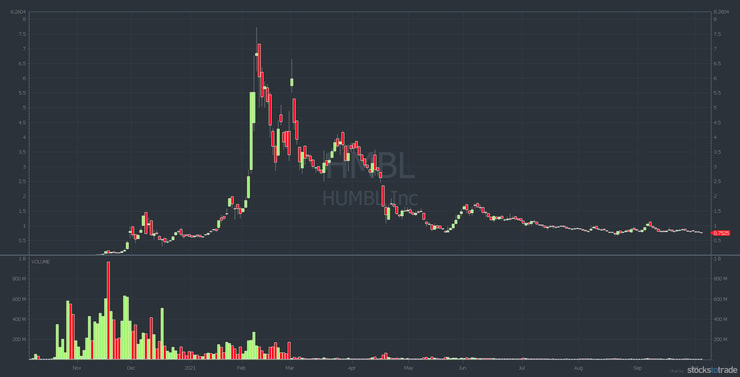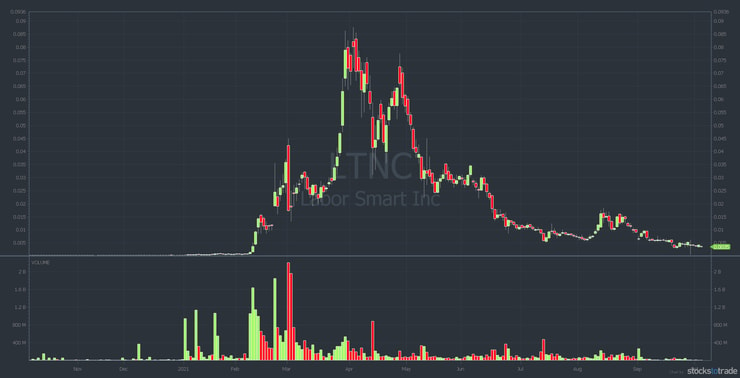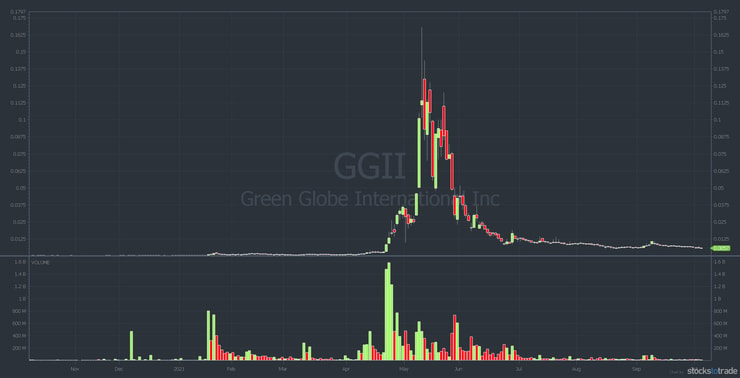Lessons From the Latest Facebook Scandal: Key Takeaways
- Revealed: The ‘Facebook Files’ whistleblower shows how Facebook prioritizes profits over people.
- Discover the shocking parallels between Facebook’s behavior and penny stock promoters.
- How promoters signal the huge drop … while still telling unsuspecting newbs to buy.
- 3 recently promoted stocks — learn this pattern!
- Appreciate the misinformation in this industry but don’t become one of the suckers.
Rare Opportunity! Trade With Me All Day on Friday, October 8
It was pretty crazy to see the latest Facebook scandal unfold, with the whistleblower, Frances Haugen, appearing on “60 Minutes.” Haugen is a data scientist and her allegations are pretty damning. She also testified before Congress on October 5.
Table of Contents
What the Facebook Whistleblower Revealed

The gist of what Haugen said was that Facebook puts its profits ahead of concern for the general public. She went into detail about how the company treats misinformation and hate speech.
It’s not a total surprise, but the interview shows that Facebook had knowledge of what they were doing. She presents her case well. I highly recommend you watch her interview.
Facebook’s director of policy communications responded to the “60 Minutes” report…
“We’ve invested heavily in people and technology to keep our platform safe, and have made fighting misinformation and providing authoritative information a priority.”
That sounds a lot like when a promoter tweets…
“The team doing this DD is PAYING for some of the research. Like an investment. People don’t seem to understand this. Why pay for it if it’s not legit? This is happening. Get on board.”
Promoters and Facebook: The Parallels
It’s not an exact comparison, obviously. Promoters aren’t legit. They’re not a big, profitable, powerful company. But promoters do prioritize their profits ahead of education and information.
Facebook Whistleblower Lessons On Misinformation
This was my initial take…
Now let’s look at the parallels…
Promoters and Facebook Value Misinformation Over the Truth
Again, Facebook vs. penny stocks isn’t an exact comparison. But it’s similar in that misinformation online leads people to do stupid things.
In her interview, Haugen said, “Facebook is trying to optimize for what it calls meaningful social interactions. And those are reacts, likes, [and] comments.”
Misinformation gets better interaction. It’s more polarizing. That’s more profitable for Facebook and publishers. So publishers start to recognize what drives the most traffic from Facebook. And then they publish more polarizing content.
Promoters say a stock is spiking because of the “DD and catalysts.” (DD is promoter speak for due diligence.) But it’s all part of a misinformation campaign. They say, “this company is revolutionizing this industry, it’s gonna change the world.” It’s not — it’s a pump.
Newbies and idiots fall for it, hook, line, and sinker.
More Breaking News
- Goodyear Faces Challenges with Earnings Miss Amid Industry Turbulence
- QuantumScape Takes a Big Leap with New Battery Line
- Strategic Moves Propel CCH Holdings: Stock Soars
- Entegris Faces CFO Transition Amid Price Target Boosts from Analysts
Promoters and Facebook Value Profits Over People
While at Facebook, Haugen said she saw “[…] conflicts of interest between what was good for the public, and what was good for Facebook. And Facebook, over and over again, chose to optimize for its own interests like making more money.”
Promoters prioritize their own promo jobs. They sell their own positions or allow whoever hired them to sell their positions. And they value that over the truth.
Promoters and Facebook Use Anger to Lure in Newbies and Idiots
Haugen also said, “Publishers know you are more likely to engage with angry content. There is a perfect reverse correlation … the more angry you are, the more traffic leaves Facebook and goes to the publishing site.”
According to Haugen, Facebook’s own internal studies show that they know this creates civil unrest. She said that in some countries, misinformation was directly leading to people dying. The allegations are pretty damning.
I’m not suggesting that what promoters do leads to people dying. But they do try to lure in newbies by making them angry. They don’t want you to leave Twitter or their chat room — they want you to buy their pump.
They do it by attacking me for trying to educate people. They say, “Sykes and his followers are shorting. Hold the line. Let’s make him feel the pain.” Especially near the end of the promotion.
After seeing it enough times, I realized what they were doing. Now I have a new way to spot the top of a penny stock pump.
Why the Facebook Whistleblower Took a Stand

When asked why she took a stand, Frances Haugen said…
“Imagine you know what’s going on inside of Facebook and you know no one on the outside knows.” She even went on to say Facebook should declare moral bankruptcy. She thinks there should be regulations and a complete reset at Facebook.
For me, it’s a little different…
Not a Normal Whistleblower
My goal isn’t to get the promoters to stop. I don’t want the promoters to stop. Frankly, they create the best patterns and predictable trading opportunities. (And I’m eternally grateful.)
Here are three examples of big-time promoted stocks from the past year. Notice the similarity in the charts…
HUMBL Inc. (OTCPK: HMBL)
This stock was my single biggest winner of the past two years.* (Note: HMBL formerly traded as TSNP.)

I’m eternally grateful for the promoters, whoever they are. I want these stocks to go as high as possible because that creates more volatility. More upside eventually creates more downside.
Labor Smart/Takeover Industries (OTC Dark or Defunct: LTNC)
LTNC is another example of a stock that ran with a crazy number of promoters…

LTNC promoters even started the #LTNCArmy hashtag. They had hundreds of newbies duped into believing it was a “single stock retirement plan.” NOT!
One of the first pumps where I started recognizing the promoter attacks was…
Green Globe International, Inc.
Promoters used dozens of fake accounts to attack me, saying I was short selling. All I ever did was buy GGII.*

Once I started getting attacked, it blew me away how many fake accounts there were. Only recently did I really put two and two together. Whenever they start attacking me, it signals the top of the pump.
And I also think it could be just a handful of promoters using bot farms in a foreign country.
The most important thing to understand is…
Penny Stock Promotions End the Same Way Every Time

Promoted penny stocks have been around for decades — long before I started trading.
I’m eternally grateful for the promoters, whoever they are. But I do want to highlight their behavior to educate people.
You don’t have to go down with the ship.
Instead, learn to exploit the informational inefficiency. I want these stocks to go as high as possible because that creates more volatility. More upside eventually creates more downside.
It’s the Same Pattern
It’s the same story every time. It astounds me that anybody looking at these charts doesn’t see it.
Frances Haugen couldn’t ignore what she saw happening at Facebook again and again. I can’t ignore what I see happening with promoters. Especially now that they’re signaling the top. I’ll just keep teaching what I’ve seen in 20+ years of trading and now 13 years of teaching.
Watch Me Trade in Real Time
Want to see it in real time? I’m doing another all-day live trading webinar on Friday. It’s a great way to learn my process. You can ask questions, watch me trade, and get my take on the markets that day.
Register for Trading Mastery Here
But let me suggest one thing…
Some people show up without questions ready — they’re not prepared. So prepare ahead of time.
What should you study? Start with the links in this post — especially How to Spot the Top of a Penny Stock Pump in 2021. And also Learn the 7-Step Pennystocking Framework.
Then…
If you haven’t already been through it, at least start the 30-Day Bootcamp before Friday. (It covers the 7-step framework and how promoters lure in newbies.) If you’ve already been through it, now’s the time to review.
What do you think of the parallels between Facebook and penny stock promoters? Comment below, I love to hear from all my readers!
Disclaimers
*Results are not typical and will vary from person to person. Making money trading stocks takes time, dedication, and hard work. Most who receive free or paid content will make little or no money because they will not apply the skills being taught. Any results displayed are exceptional. We do not guarantee any outcome regarding your earnings or income as the factors that impact such results are numerous and uncontrollable.





Leave a reply